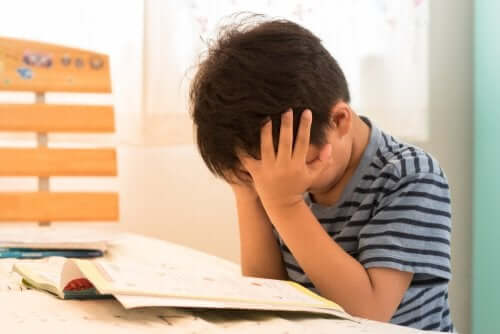The Fear of Failure in Children at School

For your children, exam time can be very overwhelming. This is because not everyone feels capable of passing. In fact, the fear of failure in children is so strong that it can paralyze them during a school test. In addition, it causes them stomach or headaches.
Perhaps this is why you’re wondering what you can do to help. In this article, we’ll share some very practical suggestions.
How to help control the fear of failure in children
It’s true that children may be physically or emotionally affected. However, if you provide them with the necessary help, they’ll be able to finish the school year without any difficulties.
When your children tell you they’re afraid of failing their exams, help them convince themselves that they can do it. For this purpose, encourage them to frequently repeat positive words. For example, “I can do it because I’m smart.” This will help boost their self-esteem.
Teach your child relaxation techniques
The best-known technique is to breathe deeply for a few seconds and then exhale. This technique and others can relax your children and better prepare them to take a test. You must teach them to do this even when you’re not around, as their teachers may surprise them with pop quizzes.
Maybe your child thinks that biting their nails or other behaviors may help calm them down. However, the effect is the opposite, as they’ll become a lot more anxious.
Practice test
To overcome the fear of failure in children, make them take a practice test. To do this, write the possible questions that’ll come up on their test on a sheet of paper. This way, your children will know what awaits them and be more confident in themselves. In addition, if they don’t know an answer, you’ll be able to help them.

Create good habits
In this regard, it’s important for your children to be well-fed and exercise frequently. This way, they’ll have energy and improve their concentration and memory. So consequently, they won’t forget what they learned.
Nevertheless, their diet isn’t the only important thing. They also need good study habits. Make sure that your children study days before the exam and do an overview the day before. Never let them learn things the same day, as this will cause more anxiety.
Another important thing to consider is that they should arrive early to school that day. This is because any delay during the ride over can cause tension in your child.
Answer the questions they know first
Doing this will ensure your child doesn’t fail by leaving their test blank. After they answer all the questions they know, perhaps they’ll be more relaxed and will remember what they studied so they can answer the rest. Teach them to review their test before handing it in to correct their grammar and spelling so they don’t lose any unnecessary points.
If they fail the test, tell your child to ask their teacher what mistakes they made and to help them answer those questions correctly. On the other hand, if your child passes, don’t forget to congratulate them. This way, they’ll feel more motivated.
How do children express their anxiety?
The idea of doing a test and failing it can make your children seem overly anxious. This problem can be so serious that they may decide not to take the test at all and give up on their studies due to their fear of failure.

Although it’s hard to believe, those who suffer from this fear of failure are usually gifted children. It’s not that they don’t have the capacity to pass. Instead, the fear of failure in children is so strong that it limits them. The ways children tend to manifest this are:
- At a physiological level. They may suffer from sweating, insomnia, digestive problems, vomiting, palpitations, and headaches. In addition, shortness of breath, difficulty breathing, and rapid pulse.
- At a behavioral level. Even their behavior can be affected. In this regard, they may be easily irritated and get angry for any reason. Also, they may suffer from clumsiness, tics, tremors or, conversely, complete immobility.
- At a cognitive level. Insecurity, dispersed thoughts, loss of concentration, forgetfulness, and doubts.
In short, the fear of failure is strong but not impossible to overcome. They just need a little help to boost their self-esteem and feel able to pass school tests.
For your children, exam time can be very overwhelming. This is because not everyone feels capable of passing. In fact, the fear of failure in children is so strong that it can paralyze them during a school test. In addition, it causes them stomach or headaches.
Perhaps this is why you’re wondering what you can do to help. In this article, we’ll share some very practical suggestions.
How to help control the fear of failure in children
It’s true that children may be physically or emotionally affected. However, if you provide them with the necessary help, they’ll be able to finish the school year without any difficulties.
When your children tell you they’re afraid of failing their exams, help them convince themselves that they can do it. For this purpose, encourage them to frequently repeat positive words. For example, “I can do it because I’m smart.” This will help boost their self-esteem.
Teach your child relaxation techniques
The best-known technique is to breathe deeply for a few seconds and then exhale. This technique and others can relax your children and better prepare them to take a test. You must teach them to do this even when you’re not around, as their teachers may surprise them with pop quizzes.
Maybe your child thinks that biting their nails or other behaviors may help calm them down. However, the effect is the opposite, as they’ll become a lot more anxious.
Practice test
To overcome the fear of failure in children, make them take a practice test. To do this, write the possible questions that’ll come up on their test on a sheet of paper. This way, your children will know what awaits them and be more confident in themselves. In addition, if they don’t know an answer, you’ll be able to help them.

Create good habits
In this regard, it’s important for your children to be well-fed and exercise frequently. This way, they’ll have energy and improve their concentration and memory. So consequently, they won’t forget what they learned.
Nevertheless, their diet isn’t the only important thing. They also need good study habits. Make sure that your children study days before the exam and do an overview the day before. Never let them learn things the same day, as this will cause more anxiety.
Another important thing to consider is that they should arrive early to school that day. This is because any delay during the ride over can cause tension in your child.
Answer the questions they know first
Doing this will ensure your child doesn’t fail by leaving their test blank. After they answer all the questions they know, perhaps they’ll be more relaxed and will remember what they studied so they can answer the rest. Teach them to review their test before handing it in to correct their grammar and spelling so they don’t lose any unnecessary points.
If they fail the test, tell your child to ask their teacher what mistakes they made and to help them answer those questions correctly. On the other hand, if your child passes, don’t forget to congratulate them. This way, they’ll feel more motivated.
How do children express their anxiety?
The idea of doing a test and failing it can make your children seem overly anxious. This problem can be so serious that they may decide not to take the test at all and give up on their studies due to their fear of failure.

Although it’s hard to believe, those who suffer from this fear of failure are usually gifted children. It’s not that they don’t have the capacity to pass. Instead, the fear of failure in children is so strong that it limits them. The ways children tend to manifest this are:
- At a physiological level. They may suffer from sweating, insomnia, digestive problems, vomiting, palpitations, and headaches. In addition, shortness of breath, difficulty breathing, and rapid pulse.
- At a behavioral level. Even their behavior can be affected. In this regard, they may be easily irritated and get angry for any reason. Also, they may suffer from clumsiness, tics, tremors or, conversely, complete immobility.
- At a cognitive level. Insecurity, dispersed thoughts, loss of concentration, forgetfulness, and doubts.
In short, the fear of failure is strong but not impossible to overcome. They just need a little help to boost their self-esteem and feel able to pass school tests.
All cited sources were thoroughly reviewed by our team to ensure their quality, reliability, currency, and validity. The bibliography of this article was considered reliable and of academic or scientific accuracy.
- Alvarez-Icaza, M. A. V., Gómez-Maqueo, E. L., & Patiño, C. D. (2004). La influencia de la autoestima en la percepción del estrés y el afrontamiento en niños de edad escolar. Salud Mental. http://doi.org/10.2216/08-04.1
- Peréz, M. (2000). El miedo y sus transtornos en la infancia. Prevención e intervencion Educativa. Facultad de Educación. Universidad de Salamanca.
This text is provided for informational purposes only and does not replace consultation with a professional. If in doubt, consult your specialist.








